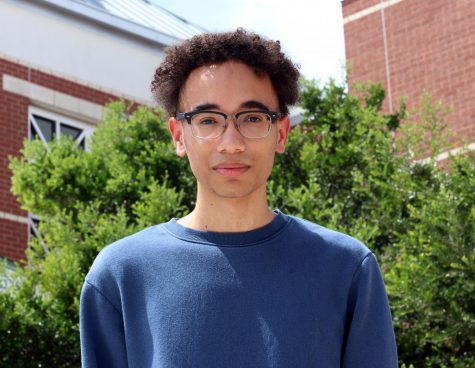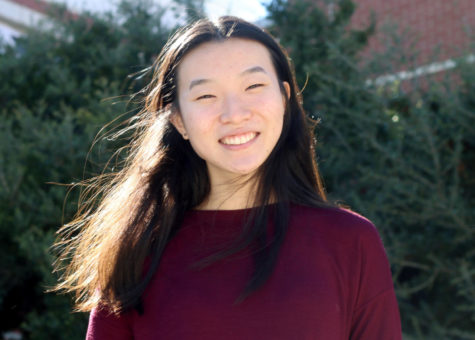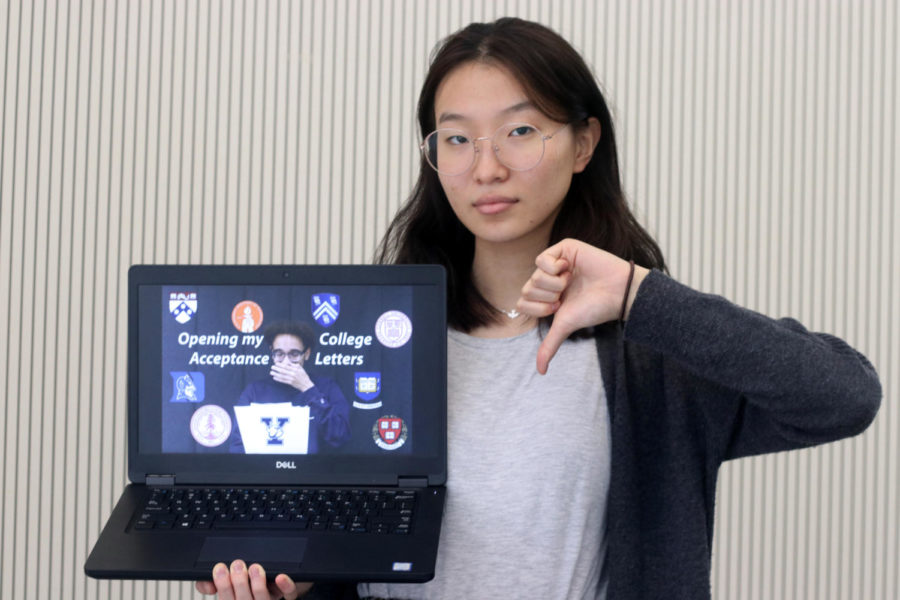Point/Counterpoint: College Reaction Videos
For college reaction videos: Ian Wright
With the end of each year’s college application process, high school seniors often record their reactions to college admissions decisions and post them online. Throughout my college application process, I constantly viewed these videos from past years. I became enthused watching people get into their dream schools and seeing the wave of excitement they felt — it was almost like watching a movie, waiting for the outcome in suspense.
College reaction videos usually begin with students summarizing their college application process and information about them. They list schools they applied to, their GPA, standardized test scores, extracurriculars and personal accomplishments. Through watching these videos, I learned a lot of important things regarding the college admission process. The most significant one is the importance of creating a balanced college list. They’ve shown me how unpredictable the college admissions process is — like how people with perfect GPAs and 1600 SAT scores can get rejected from top colleges — and to apply to plenty of target and safety schools.
Moreover, I learned the importance of essays in the college admissions process and tons of helpful tips. As a result, I spent lots of time writing and refining my own college essays. These students can provide valuable insight into the process and suggestions which I believe can benefit others just as they benefitted me.
These videos also gave me hope for applying to top colleges. When I began creating my college list, I became hyper fixated on acceptance rates and, as a result, became deterred from applying to very selective colleges. I remember visiting my dream university and falling in love with it, but then feeling disappointed because I knew the chance of me getting accepted was slim. Through viewing college admissions videos and watching people with similar stats get into their dream school, however, I became motivated. I spent hours crafting the “perfect” application with the hope of feeling the joy the people in the videos felt — and it all worked out for me.
The most common critique of college reaction videos is the fact that the people posting the videos overwhelmingly receive positive results as those who are waitlisted or rejected aren’t inclined to post their disappointing reactions. Many people say these videos give people a false sense of hope, and while this is true, I don’t believe that is the fault of the videos themselves.
Obviously college reaction videos cannot encapsulate how hard getting into top colleges is — and they shouldn’t. People are simply showcasing the happiest moments of their lives, and there is nothing wrong with that. For rising seniors, I recommend watching college reaction videos, but don’t take them too seriously. People should realize that these videos are just showing the end product, not the months spent refining their applications, the overwhelming stress and anxiety or the fact that the college decisions are largely out of the applicants’ control once submitted.
Against college reaction videos: Yunseo Jo
During April of every year, my YouTube account will suggest videos with titles along the lines “Ivy Day reaction video… 20+ colleges.” The wholesome reaction of seeing students cheer alongside their families gave me a sense of thrill, and I dreamed of my senior year ending in a similar way to what these students showed. But with the past four years being far from what my naive freshman self had envisioned, that dream started to slip away.
These videos would often begin with providing the list of colleges the students applied to, sometimes followed by a prediction of which colleges will accept, waitlist and reject them. The college list that students often use consists of safety, target or reach schools based on their statistics and the colleges’ acceptance rate. As I watched countless reaction videos throughout the years, I wanted to mold myself into the “perfect applicant” for these top schools by having an intense course load and gaining experiences that would appear impressive. However, I quickly came to realize that becoming an ideal applicant loses some of the most important aspects of what admissions counselors look for: individuality and authenticity.
Even though students can give useful advice on how to approach college applications in general, the videos provide viewers a false sense of hope because the majority of applicants who apply to competitive schools aren’t accepted. In fact, the reason that these videos get uploaded in the first place is for students to share their accomplishments of getting into their reach schools.
Creators are able to lie and underestimate how much time it actually took, making the entire process of college application look like a breeze since viewers aren’t given insight into writing multiple short answer essays or crafting a resume, which take immense effort. When I started watching these videos during freshman year, I imagined myself applying to over 15 different colleges and universities, but I realized it was useless to apply to places I didn’t even want to go, even if the school was considered “prestigious.”
Despite these videos helping viewers get an understanding of the type of students these colleges are looking for, having specific statistics, extracurriculars and awards don’t equate to having better chances. I learned this first hand after applying early to one of my safety schools and not being granted admission despite having statistics that were above average for this school; I realized that my extracurriculars and the organizations I involved myself in did not share the same views that resonated with that of the student body of the campus. I learned that even if we don’t end up seeing the results that we expected, a lot of factors in applying to colleges are beyond my control and no one should let one random person reading your application dictate your future.
Although the unpredictability of college admissions as shown by these videos did reveal itself in my college application journey, I firmly disagree with the messages that viewers can take away from watching the videos. College applications on their own are tedious, but viewers won’t realize that by watching reactions that only show students reaping the fruits. Creators of these videos should emphasize the importance of showing their individuality in their applications rather than sharing mere statistics and extracurriculars, because authenticity is ultimately what admissions counselors look for.

Senior Ian Wright is the opinion section editor and this is his second year on staff. He enjoys listening to music, traveling to new places, watching Netflix...

Senior Yunseo Jo is a reporter and this is her first year on staff. She is a dog whisperer who enjoys reading and digital art.

Senior Sarosh Ismail is the visual editor and this is her third year on staff. Ismail has an unhealthy obsession with coffee, loves her dog and has too...



